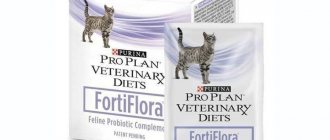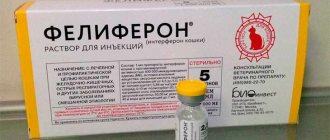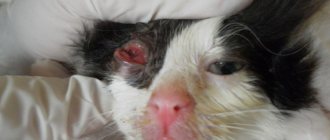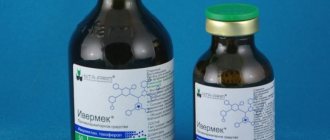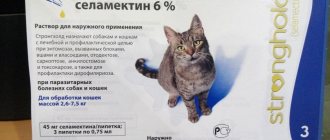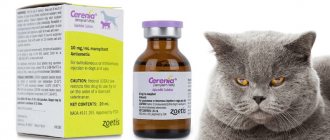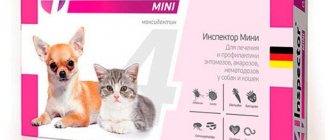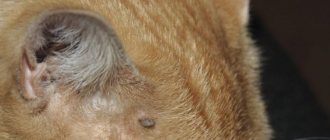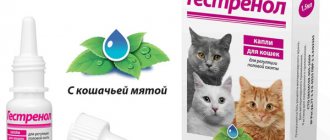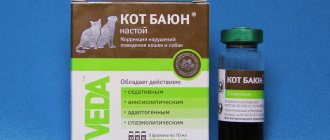- Posted by Olesya Vakhraneva
- Date: November 29, 2018
In cats, even completely healthy ones, stool disorders can occur due to a violation of the ratio of the types of intestinal microflora. The same problem, only more pronounced, can occur after completing a course of antibacterial therapy or when introducing new foods into the diet. The food supplement Fortiflora will help solve the problem of “low blood loss”.
- 2 Mechanism of action of Fortiflora
- 3 Indications for use
- 4 How to use Fortiflora correctly
4.1 Features of use in kittens and pregnant cats
Composition and release form of Fortiflora
Fortiflora is a probiotic dietary supplement developed by Purina. It is a light brown powder with light single grains, packaged in paper sachet bags, lined with foil on the inside, 1 g each. Sachet bags are packed in 30 pieces in cardboard packs. Fortiflora contains bacteria necessary for maintaining health, which have a number of beneficial qualities:
- prevent the development of pathogenic microbial flora on the intestinal mucosa;
- promote the absorption of nutrients from food;
- participate in the neutralization of substances such as bacterial toxins;
- heavy metal salts;
- allergens;
- antibacterial drugs;
Each single dose of Fortiflora is placed in a sachet; cardboard packaging contains 30 sachets
Composition of Fortiflora:
- live microencapsulated microorganisms Enterococcus faecium SF68 - minimum 1x108 CFU/g;
- proteins - 45%;
- fats - 15%;
- fiber - 0.5%;
- vitamin E - 5000 mg/kg;
- vitamin C - 3500 mg/kg;
- taurine - 2500 mg/kg;
- metabolic energy 3.1 kcal/g.
Fortiflora ingredients:
- Digest of animal origin - made from hydrolyzed tissue of animal origin; contains enzymes that improve digestion;
- Enterococcus faecium SF68 is the main component of the dietary supplement; probiotic bacteria;
- vitamin C is a strong antioxidant; strengthens connective tissue and vascular walls; inactivates cell-damaging free radicals;
- vitamin E - has an antioxidant and anti-inflammatory effect; accelerates the formation of T-lymphocytes; improves the function of the sex glands;
- beta-carotene - vitamin A; improves the condition of the skin and mucous membranes, has a positive effect on vision, and promotes the restoration of damaged tissues;
- zinc proteinate - necessary for the synthesis of insulin, proteins and the absorption of vitamin A; formation of lymphocytes;
- taurine is an essential amino acid that improves blood supply and metabolism in muscle tissue, including the heart muscle; regulates blood levels of antioxidant vitamins C and E; needed for the formation of bile;
- manganese proteinate - also participates in the synthesis of insulin, as well as the absorption of vitamins A, B, C, E;
- ferrous sulfate - provides iron for building hemoglobin molecules;
- Copper proteinate - has a positive effect on coat color and reproductive system;
- calcium iodate - a source of iodine to improve the functioning of the thyroid gland;
- sodium selenite - serves as a source of selenium, acts as an antioxidant; prevents the development of cardiomyopathy caused by selenium deficiency in young animals.
Fortiflora is added to the food consumed; Thanks to its pleasant taste and smell, cats eat it with pleasure
Probiotic reviews
According to consumer reviews, Fortiflora for cats has established itself as an effective feed additive that copes well with disorders of the digestive system. It is easy to use and is well eaten by pets.
Negative reviews most often mention that Fortiflora does not always help improve bowel movements and occasionally causes allergic reactions. Also, some owners claim that their cats do not like the taste of the probiotic supplement and refuse to take it voluntarily.
How to use Fortiflora correctly
The product is very convenient to use - the contents of the bag are poured into the cat's food; The usual dose is 1 g (1 sachet packet) of the product once a day. Cats like the taste and smell of the drug, and they willingly eat the nutritional supplement. Can be added to both dry and wet food. The dose of the product does not change depending on the age, weight and size of the pet. The course of administration can be unlimited, usually based on the prescription of a veterinarian.
Features of use in kittens and pregnant cats
Due to its safe composition, Fortiflora is used both in kittens and pregnant cats. Fortiflora is especially useful for bottle-fed kittens, since they do not receive the necessary bacterial flora from the mother cat to populate the intestines and ensure their proper functioning.
Instructions for use
It is recommended to give Fortiflor to cats once a day. The daily dose of a probiotic supplement is 1 sachet, regardless of the weight and age of the animal. The powder can be mixed with dry and wet food, as well as with natural food. The instructions do not contain recommendations regarding the time of taking Fortiflora, so it can be given both in the morning and in the evening.
The duration of the course of application is determined individually. When treating gastrointestinal diseases, taking the supplement lasts until the symptoms disappear completely. When using Fortiflora for the prevention of disorders caused by stress, it begins to be given three days before the expected event and within three days after.
Important! Fortiflora for cats cannot be subjected to heat treatment, since as a result of heating, living bacteria die and the powder loses its effectiveness.
According to the instructions, the only contraindication to the use of a probiotic supplement is a specific food allergy. It can be used for kittens, pregnant and lactating cats. Typically, a probiotic supplement does not cause side effects. But sometimes cats develop allergies, manifested by itching, skin rashes and increasing diarrhea.
In this case, Fortiflora is stopped, and the animals are prescribed symptomatic treatment.
Table: comparison of Fortiflor and its analogues
| Name | Compound | Indications | Contraindications | Price |
| Fortiflora | Enterococcus faecium; proteins, fats, fiber, vitamins C and E, taurine | Intestinal dysbacteriosis; violation of the consistency of feces in kittens; as part of the treatment of pathology of the digestive system; diarrhea caused by poor diet, taking antibacterial drugs or stress | Individual hypersensitivity to the components included in the composition | 1460 for 30 sachets (1 sachet per day) |
| Lactobifid | Lyophilisate of cultures of lactobacilli, bifidobacteria, streptococci; powdered milk, lactose | During periods of increased stress on the body - during stress, decreased immunity, after taking antibacterial drugs, previous infectious diseases, surgical interventions, vaccinations; when changing the type of diet; during pregnancy, as well as after childbirth; to improve the elimination of toxins in liver failure; during the recovery period after severe blood loss, burns | Individual hypersensitivity to the components included in the composition | 88 for 20 tablets (one tablet per day) |
| Prokolin | Enterococcus faecium, fructooligosaccharides, acacia extract, pectin, dextrose, kaolin, soybean oil | For acute poisoning, infectious diseases, antibacterial therapy, helminthiasis, stool disorders due to stress or changes in diet | Individual hypersensitivity to the components included in the composition | 800–1000 per 30 ml (1–2 ml per day) |
Indications for use
According to the instructions, Fortiflora for cats from Proplan is prescribed as part of complex therapy for disorders of the digestive system.
A probiotic supplement is used for problems such as:
- poor stool quality;
- poor appetite;
- reduced immunity;
- loose stools caused by stress, taking antibiotics or a change in diet.
Side effects
Due to the fact that the drug contains only active substances that have a positive effect on the functioning of the gastrointestinal tract, they are not capable of causing such reactions. And there can be no overdose, because each dose is designed for one use per day, as evidenced by the number of sachets developed for a monthly course of treatment.
Reviews from experts and owners
Recently my cat started vomiting. I adjusted his diet, but the problem did not go away. Then I turned to the veterinarian for help. He prescribed a course of Fortiflora. After a couple of days, the pet began to feel much better. His appetite improved and the urge to vomit disappeared. In addition, after using the nutritional supplement, the animal’s stool improved and its motor activity increased.
Using this tool is very simple. Simply open the bag and pour its contents into your cat's regular food. No side effects were observed during treatment.
Nadezhda Shemyakina, Ryazan
The popularity of this cat food additive is the result of the work of experienced professionals. It contains beneficial bacteria that improve the functioning of the gastrointestinal tract in cats with various digestive disorders. The drug has practically no contraindications or side effects. It is very convenient and simple to use. The condition of animals taking Fortiflora improves in just a few days. Despite the high cost of the product, consumers speak only positively about it.
Oleg Borkovskoy (veterinarian), Tver
About a month ago, my beloved cat Lucy became very ill.
She stopped eating and slept all day. The vet prescribed antibiotics and the Fortiflor supplement. After 3-4 days, the pet became more active and began to eat. She was completely cured within a week. Good supplement. Now I will give it to Lucy for prevention. Alena Varlamova, Pushkino
Acipol
* For dysbacteriosis
1. According to IQUIA Solutions LLC data for January – December 2021. The average retail price for the drug Atsipol is 352 rubles 84 kopecks
2. O. V. Molochkova, O. V. Kladova, A. A. Novokshonov, N. L. Valts, Yu. V. Kompaniets, N. L. Grishkevich. Prevention of antibiotic-associated diarrhea in children with a lactose-containing probiotic. Children's infections 2021, No. 4, S 37-411
3. List of studies conducted:
Novokshenov A. A., Molochkova O. V. et al. The use of a domestic probiotic containing Lactobacillus acidophilus for the treatment of acute intestinal infections and other pathologies in children. Therapy issues. Children's infections 2021, No. 1. Kladova O. V. et al. Preventive and therapeutic effectiveness of Acipol for antibiotic-associated diarrhea in children // Children's infections. – 2009. – No. 2. – P.44-47. Maev I.V. et al. Possibilities for the prevention of idiopathic antibiotic-associated diarrhea in adults. //Russian Journal of Gastroenterology, Hepatology, Coloproctology. – 2009. – No. 2. – pp. 75-78. Novokshonov A.A., Sokolova N.V., Berezhkova T.V., Sakharova A.A. Clinical effectiveness of the probiotic “Acipol” in the complex therapy of acute intestinal infections of bacterial, viral and viral-bacterial etiology in children // Children's infections. – 2009. – No. 4. – P. 61-65. Barmina O.S., Gorelov A.V., Usenko D.V., Ardatskaya M.D. Clinical and laboratory effectiveness of the multiprobiotic drug Acipol in the complex therapy of “invasive” acute intestinal infections in children // Infectious diseases. – 2009. – T.7, No. 1. – p.76-79. Bulanova I.A. Rationale for the use of lactose-containing probiotics for acute watery diarrhea in young children. Abstract. diss. Ph.D. honey. Sci. - Arkhangelsk, 2008. - 24 p. Yurlova E.V., Grigorovich M.S., Chastoedova I.A. State of enzyme secretion function in acute intestinal infections in children against the background of probiotic correction // Questions of practical pediatrics. – 2011. – T. 6, No. 3. - With. 97–101 Feklisova L.V. The use of lactose-containing probiotics: an assessment of the long-term use of Acipol in pediatric practice // Pediatrics. – 2007. – No. 2. – P. 123-127. Oleinichenko E.V., Mitrokhin S.D., Nonikov V.E., Minaev V.I. The effectiveness of acipol in the prevention of intestinal dysbiosis during antibacterial therapy // Antibiotics and chemotherapy. – 1999. – No. 1. – P.23-25. Volodko N.A., Konstantinova A.V., Klimenko N.Yu. Comparative effectiveness of drugs with different effects on the intestinal biocenosis in patients with respiratory tuberculosis // International Journal on Immunorehabilitation. - 2010. - T. 12. No. 2. - P. 120-121. Tselipanova E.E., Shebekova V.M., Savitskaya K.I., Rusanova E.V., Matveevskaya N.S. Clinical and immunological effectiveness of Acipol in children with acute respiratory infection // Almanac of Clinical Medicine. - 2002. - No. 5. - P. 260-264. Savenkova M.S., Afanasyeva A.A. Treatment of infections: antibacterial and probiotic effects // Pediatrics. - 2008. - No. 1. - P. 38-40. Gordeets A.V., Piskunova S.L., Chernikova A.A. Optimization of ARVI therapy in children during an influenza pandemic // Children's infections. - 2011.- No. 4. -P.52-56. Kushnareva M.V., Dementyeva G.M., Feklisova L.V., Chernogor I.N. The influence of eubiotic drugs on local intestinal immunity in premature infants with infectious and inflammatory diseases. // Pediatrics. - 2003. - No. 3. - P. 11-14. Novikova V.P., Gurova M.M., Tsekh O.M. Complex treatment using probiotics based on lactobacilli in children with chronic gastroduodenitis in remission. Advanced medical technology. - St. Petersburg, 2010. - 24 p. Nikitina L.V., Kalutsky P.V., Lazarev A.I., Besedin A.V. The effectiveness of the use of a probiotic (Acipol) in the complex therapy of chronic gastroduodenitis associated with H. Pylori in children //International Journal on Immunorehabilitation. - 2010. - T. 12. No. 2. - P. 220b-220b. Revnova M. O. Efficacy of Acipol in the treatment of children with celiac disease // Pediatrics. Consilium medicum. – 2009. – No. 1. – p.58-59. Oreshko L.S., Matveeva I.I., Ivanova O.I., Prokofieva N.A., Balagaeva M.S. On the issue of the immunomodulatory effect of the drug Acipol in complex pathogenetic therapy in patients with celiac disease // Diseases of the digestive organs. – 2009.- No. 2.- P.63-65. Kryuchkova T.A. et al. Clinical effectiveness of the probiotic Acipol in children suffering from atopic deramatitis. // Scientific bulletins of BelSU. Series: Medicine. Pharmacy. 2012. No. 22 (141). Shuster A.M. et al. Possibilities for optimizing the use of probiotics in clinical practice using the example of the domestic drug Acipol®. RMJ. 2009, No. 4. Kornienko E.A., Saburova A.V. Experience with the use of the probiotic Acipol in the complex therapy of gastroduodenitis with bacterial overgrowth syndrome in the small intestine. Children's infections. 2021.-N 3.-P.46-50.
Perlamutrov Yu.N., Olkhovskaya K.B., Ivashkina N.Yu., Shuster A.M., Martyanov V.A. The influence of probiotics on the functional state of the epidermal barrier of facial skin // Bulletin of Dermatology and Venereology. - 2008. - No. 4. - P. 80-83.
4. The drug Atsipol, capsules LS-001915 has been registered in the Russian Federation since 2006, according to the State Register of Medicines of the Russian Federation. Consumer loyalty has been confirmed according to data from Mediaskop JSC, January-June 2019
